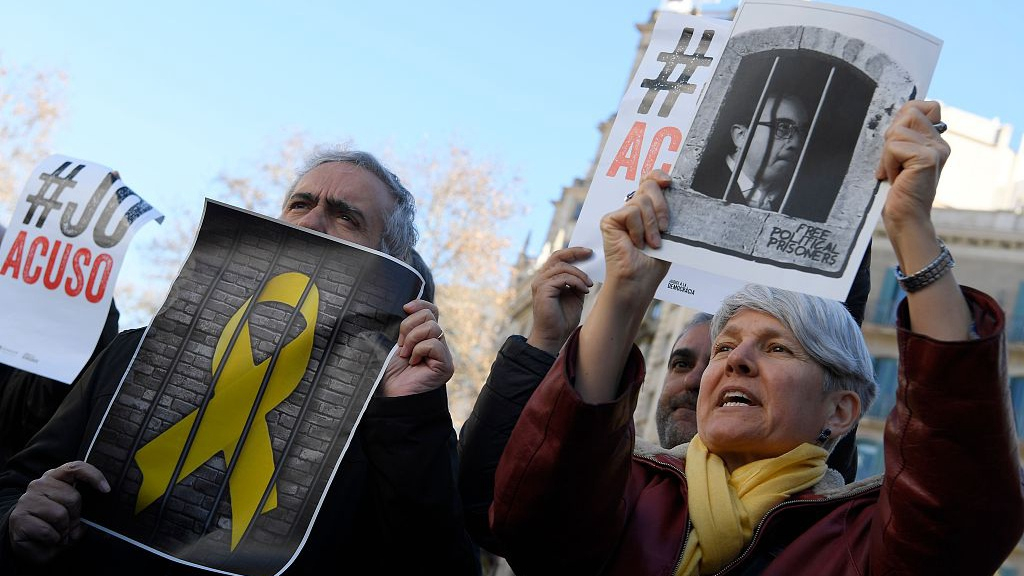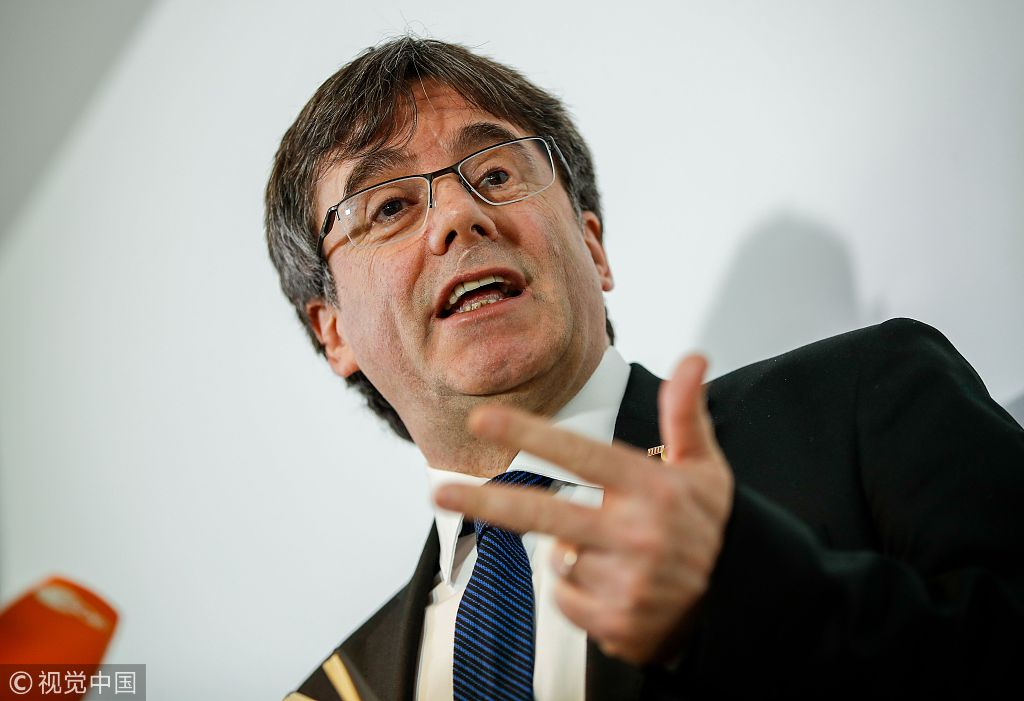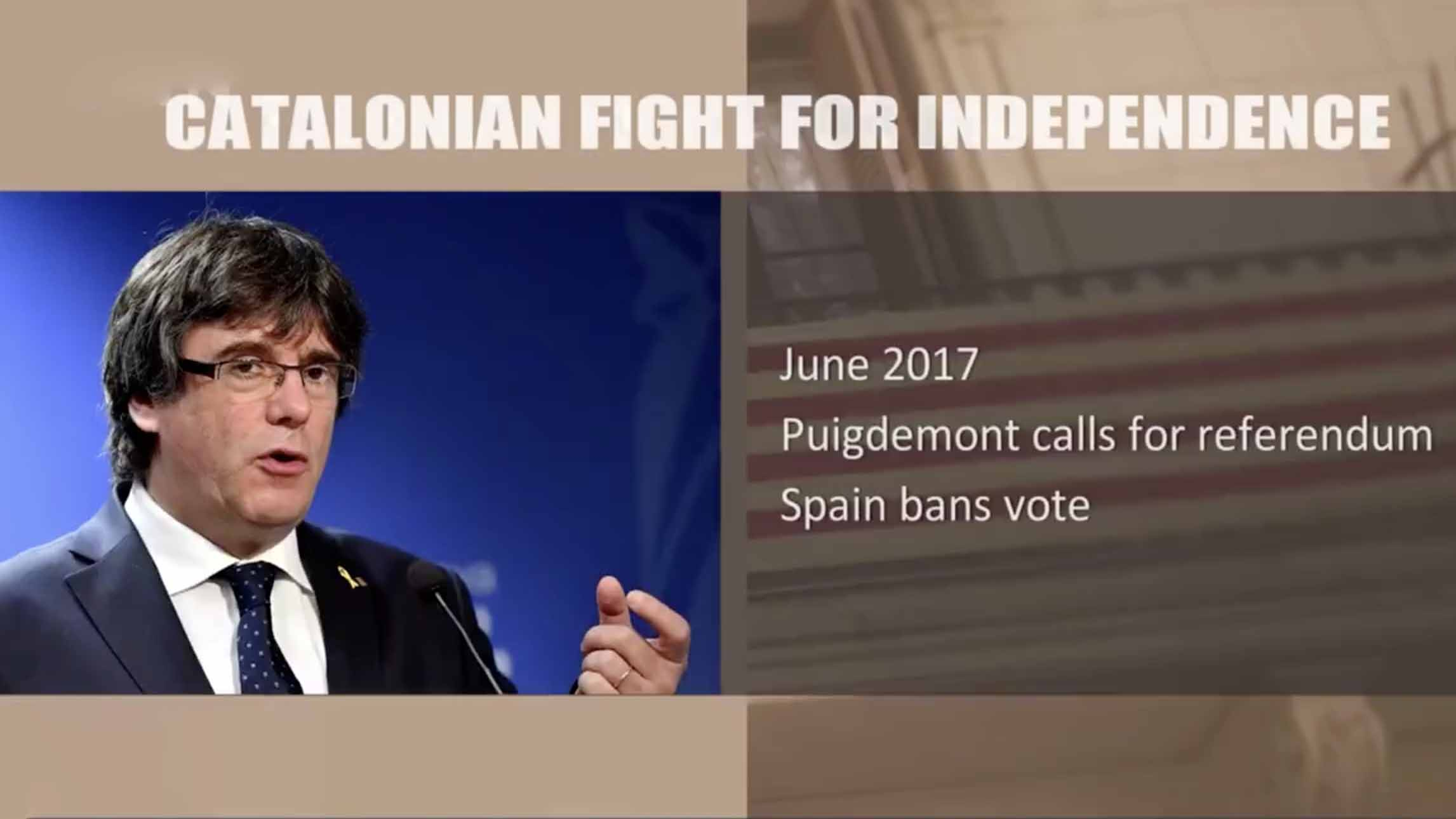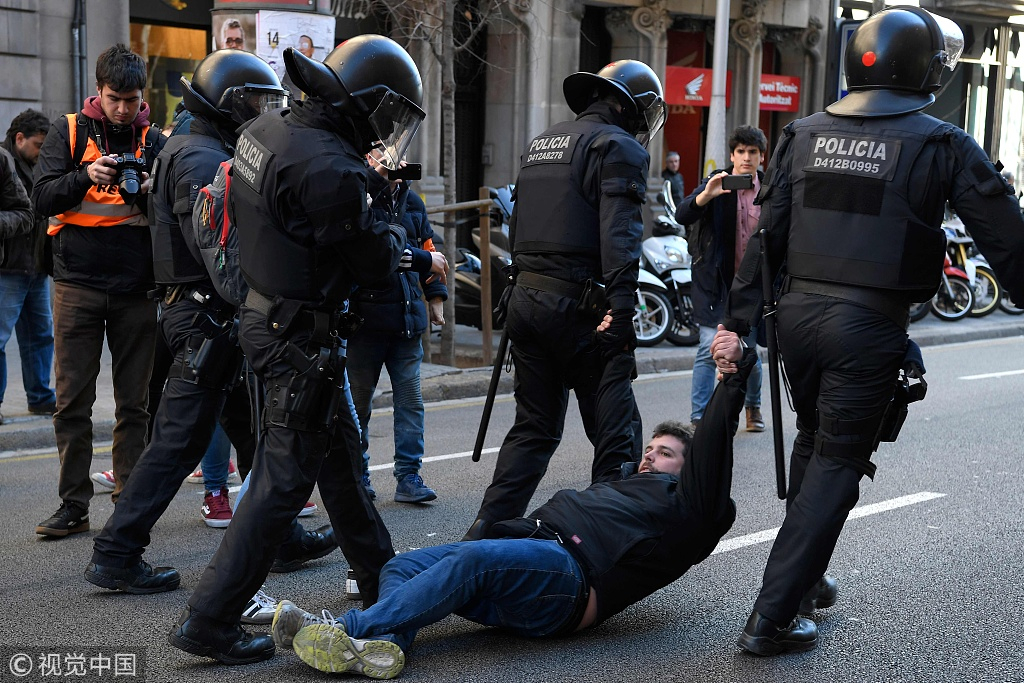
Europe
22:12, 12-Feb-2019
Catalan separatists go on trial, laying bare Spain's divisions
CGTN
01:45

Twelve Catalan separatist leaders went on trial in Madrid on Tuesday over their roles in a failed independence bid that laid bare historical divisions and triggered Spain's biggest political crisis in decades.
Flanked by hundreds of police, pro and anti-separatist demonstrators gathered outside the Supreme Court, where the defendants face charges of rebellion, sedition and misuse of public funds.
Their supporters carried signs reading "freedom for political prisoners" while a small rival group shouted "Golpista" or "coup plotter," portraying the region's independence declaration as an attempt to dismantle the Spanish state.

Jailed Catalan separatist leaders including (L-R, front row) Joaquim Forn, Raul Romeva and Oriol Junqueras sit with fellow defendants during their trial at the Supreme Court in Madrid, Spain, February 12, 2019. /VCG Photo
Jailed Catalan separatist leaders including (L-R, front row) Joaquim Forn, Raul Romeva and Oriol Junqueras sit with fellow defendants during their trial at the Supreme Court in Madrid, Spain, February 12, 2019. /VCG Photo
The charges are related to the Catalan independence referendum of October 1, 2017, which the Spanish Constitutional Court judged to be illegal, and the subsequent unilateral declaration of independence for Spain's northeastern Catalonia region on October 27.
The politically charged trial comes at a pivotal time for Spain's government, with a snap national election on the cards unless Catalan nationalist lawmakers support the 2019 budget in a vote scheduled for Wednesday.
'Test for Spain's democracy'
Former Catalan leader Carles Puigdemont, living in self-imposed exile in Belgium, said on Tuesday that the trial is a stress test for Spain's judicial system and its democracy.
During a press conference in Berlin, Puigdemont also hit out at the European Union for being "more concerned" about Venezuela than what is happening in Madrid.
"Why is the European Union more concerned with what is happening in Venezuela than what is happening in Madrid today?" he asked.

Former Catalan leader Carles Puigdemont holds a press conference in Berlin, Germany, February 12, 2019. /VCG Photo
Former Catalan leader Carles Puigdemont holds a press conference in Berlin, Germany, February 12, 2019. /VCG Photo
Spain's constitution bans any region from seceding.
Supporters of the defendants, who face up to 25 years in prison if convicted, say they are political prisoners and that the trial itself is political. The government says they are being judged solely in line with the rule of law.
None of the defendants are scheduled to speak in the first day of the trial, which is dominated by procedural issues. Nine of them have been jailed without bail since late 2017 or early 2018.
Meanwhile, seven other politicians involved in the independence declaration – including Puigdemont – are in self-imposed exile in different parts of Europe.
00:42

A 'divided' or 'united' Spain?
While declining to discuss any move toward Catalan independence, Spain's Socialist Prime Minister Pedro Sanchez has adopted a more conciliatory stance toward the secessionist movement than the conservative government that preceded him, and tried to establish dialogue.
But so far, nationalist lawmakers from the wealthy northeastern region have said they will block the budget bill, citing Sanchez's refusal to include an independence option in the talks.
With his party holding less than a quarter of seats in the lower parliamentary house, the absence of Catalan support for the budget would almost certainly sink the bill and in turn likely prompt a snap election.

Cops from Catalan regional police force, Mossos d'Esquadra, drag away a student during a protest against the trial of former Catalan separatist leaders in Barcelona, Spain, February 12, 2019. /VCG Photo
Cops from Catalan regional police force, Mossos d'Esquadra, drag away a student during a protest against the trial of former Catalan separatist leaders in Barcelona, Spain, February 12, 2019. /VCG Photo
In an early morning tweet, Sanchez said he expected both the right and pro-independence lawmakers to vote against his budget.
"They both want the same: A divided Catalonia and a divided Spain. We are working for a Catalonia in peace and a united Spain," he said.
Secessionists have called on Catalans to briefly stop work at midday on Tuesday in protest against the trial, and to join a rally in Barcelona in the evening. Another big demonstration is planned for Saturday and a general strike on February 21.
After imposing direct rule on Catalonia in October 2017 in response to the independence declaration, the previous conservative government called regional elections to curb the independence movement. But the move backfired as the secessionists retained a slim majority in the Catalan assembly.
The trial is expected to last at least three months, with a final ruling not before June.
(Cover: Demonstrators protesting against the trial of Catalan separatist leaders in Barcelona, Spain, February 12, 2019. /VCG Photo)
Source(s): Reuters
,Xinhua News Agency

SITEMAP
Copyright © 2018 CGTN. Beijing ICP prepared NO.16065310-3
Copyright © 2018 CGTN. Beijing ICP prepared NO.16065310-3